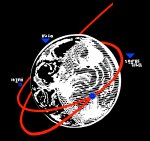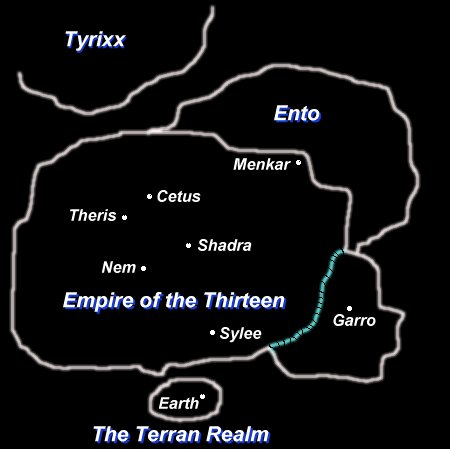
Campaign Introduction
Third World
"We have met the aliens, and they are us."
Ten years can do a lot to a world. I was born on Earth, myself, although I got the bug to go out into space, and I haven’t been back much. But I was there when the news of first contact made it back to Earth. I still remember the headlines: “We have met the aliens, and they are us.”
A small German research ship on the other side of Beta Canum discovered the alien ship in the later half of 2288. Took forever, it seems, to make any decent contact. The crew of the German ship were astrophysicists, and had never given much thought to how to conduct a first contact. But we’d been exploring space for fifty years, and we’d always figured that one day we’d meet aliens. We had diplomats if they were friendly, and nuclear warhead if they weren’t. We never anticipated that they’d be uninterested.
The alien was a member of the scout service of the Empire of the Thirteen - a six hundred year-old intersteller government spanning hundreds of individual worlds. Earth, with its two dozen colony worlds, seemed pretty puny in comparison. And we were outclassed not only in size, but in technology. The Empire had ships, weapons, tools, and computers far in advance of anything we’d ever seen. The leaders of Earth’s nations were eager to establish peaceful relations and trade agreements with the Empire. But what did Earth have to offer the Empire? Certainly not our back-water technology.
I’m a merchant, by trade. I make my living buying and selling, and moving cargo from one place to another. And after Earth contacted the Empire, the merchant business got pretty lean. Companies didn’t see the point in having large research and development groups. Average citizens wanted imperial holovid sets. The military wanted to buy imperial weapons. The economy hit rock bottom. In ten years, Earth has had to adapt to the idea that we’re not the centre of the Universe.
I suspect things might have been even worse if the Empire wasn’t preoccupied with a war: the Third Ento War on one of its other borders. Mind you, the war’s been over for a couple of years, now, and things don’t seem to be getting any better. I’ve never seen an Ento, but I’ve also never met anyone who likes them.
The Aliens

The aliens are human. Two legs. Two eyes. Arms where arms are supposed to be. And although it might have been harder to carry on a conversation with bugs or giant space amoebas, there’s something definitely creepy about a universe in which the first alien life you discover looks just like you.
But they were alien. Not in physiology, but in psychology. In many ways, they were our exact opposites.
Earthers are pretty distrustful of people who are different. Imperial citizens distrust people who are too similar to them.
Earthers are ideological, dogmatic, and driven. Imperial citizens are laid-back pragmatists.
Earthers are conservative and prudish. Imperial citizens are radical to the point of exhibitionism.
When the economy started nose-diving, it was easy for the more conservative politicians and religious leaders to blame a lot of Earth’s problems on the excesses of the Imperial way of life. Y’know how people start to get when jobs are scarce and pay increases are smaller and smaller.
The Terran Realm
Earth and its colonies have come to be known as The Terran Realm. Terran influence extends over an irregularly-shaped area of space approximately 60 light-years in diameter. Because of the limitations of faster-than-light travel, it takes about five months for information to travel from Earth to the farthest colony world. It's pretty hard to pretend that you're on top of things, when you get the news half a year late.

Now, admittedly, Terran FTL drives are slow compared to the Empire, and our understanding of FTL astrogation isn't as sophisticated as the Empire, but they've got an area of space hundreds of light-years in diameter. And, like us, they haven't found any way of shipping the mail from one world to another, other than by putting it in a ship and carrying it.
In an environment like that, one needs a certain degree of autonomy. You can't expect orders from the big chief in a reasonable time frame, so you have to trust the guy on the front line. And perhaps that's why the Empire is based on a monarchy, whereas Earth is a union of nation-states, and we're having a hard time managing colony worlds. I mean, there's about a dozen different countries with colony worlds, and sometimes, to get to supplies to a Germany's colony, you have to pass it through an Egyptian colony system. That works, so long as Germany and Egypt aren't mad at each other.
And don't forget that there's a recession on, and there's a lot of people out of work. When you're a colony, and you depend on shipments from good old mother Earth, you start to get jittery every time a new government budget is announced.
Empire
"The first Empire was completely decimated by the Tucanid invasion."
As I understand it, the Empire of the Thirteen is actually the third major interstellar government to rule that area of space. The first Empire was formed by a group of humans called the Phychi. They spread out to the stars, taking their culture, their monachy, and technology with them. They met up with other humans on other worlds, and established a significant interplanetary government. And then along came the Tucanids.
The first Empire was completely decimated by the Tucanid invasion, and the Phychi people were blasted back into the medieval age. Nobody has seen or heard of the Tucanids since then, but the Phychi still hold a grudge.
The second big government came about when another race of humans, the Shadu, developed space travel, and unified the surviving Phychi worlds. The Shadu were missionaries, preaching the gospel of their Thirteen Gods, and they founded the Holy Shadu Republic.

The Shadu were good missionaries, but their ideas about government didn't scale up to "interstellar" very well. The Holy Shadu Republic became stagnant, and collapsed under its own weight. The Phychi, who were just starting to regain its technology base, were knocked off the road to recovery when the Shadu Empire imploded.
Finally, about a six hundred years ago, individual Phychi and Shadu worlds recovered enough of their old technology to build a new, joint Empire. Phychi and Shadu had intermarried, and the first monarch of the new Empire could claim mixed heritage. The new Empire was a hybrid of the two cultures, as well. Phychi language, and Shadu religion. Phychi monarchy, and Shadu technology.
The Empire recently added a third major human race to its line-up: the Kindred. The Kindred were fiercely independent warriors who were finally conquered by the Empire a hundred and fifty years ago. The Kindred are now Imperial citizens, although I get the impression that they’re not all that happy with the arrangement.
And there are some genuine non-human aliens in the Empire as well. Like the T'yak. And the Ylems. Don't ask me for the details; I've never seen either of them.